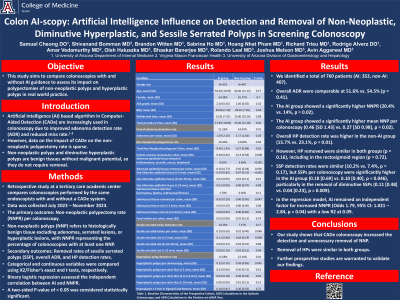Monday Poster Session
Category: General Endoscopy
P2385 - Colon AI-scopy: Artificial Intelligence Influence on Detection and Removal of Non-Neoplastic Polyps, Diminutive Hyperplastic Polyps, and Sessile Serrated Polyps in Screening Colonoscopy
Monday, October 28, 2024
10:30 AM - 4:00 PM ET
Location: Exhibit Hall E

Has Audio

Samuel H. Cheong, DO
Banner - University of Arizona
Tucson, AZ
Presenting Author(s)
Samuel H. Cheong, DO1, Shivanand Bomman, MD2, Brandon Witten, MD2, Sabrina Ho, MD1, Hoang Nhat Pham, MD1, Richard Trieu, MD1, Rodrigo Alvarez, DO1, Amar Vedamurthy, MD, MSCI, MRCP (UK)3, Oleh Haluszka, MD2, Bhaskar Banerjee, MD1, Rolando Leal, MD1, Joshua Melson, MD2, Avin Aggarwal, MD4
1Banner - University of Arizona, Tucson, AZ; 2University of Arizona College of Medicine, Tucson, AZ; 3Virginia Mason Franciscan Health, Tucson, AZ; 4University of Arizona, Tucson, AZ
Introduction: Artificial Intelligence (AI) based algorithm in Computer-Aided Detection (CADe) are increasingly used in colonoscopy due to improved Adenoma Detection Rate (ADR) and reduced miss rate. However, data on the impact of CADe on the Non-Neoplastic Polypectomy rate (NNPR) is sparse. Non-neoplastic polyps (NNP) and diminutive hyperplastic polyps (HP) are benign tissues without malignant potential, so they do not require removal. This study aims to compare colonoscopies with and without AI guidance to assess its impact on NNPR and HP polypectomies in real world practice.
Methods: This retrospective study at a tertiary care academic center compares colonoscopies performed by the same endoscopists with and without a CADe system (July to Nov 2023). The primary outcomes were NNPR and HP per colonoscopy. NNP refers to histologically benign tissue excluding adenomas, serrated lesions, or hyperplastic lesions, with NNPR representing the percentage of colonoscopies with at least one NNP. Secondary outcomes include removal rates for sessile serrated polyps (SSP), overall ADR, and HP detection rates. Categorical and continuous variables were compared using Χ2/Fisher’s exact and t tests, respectively. Binary logistic regression assessed the independent correlation between AI and NNPR. A two-sided P-value of < 0.05 was considered statistically significant. Statistical analysis was performed using SPSS.
Results: We identified a total of 760 patients (AI: 353, non-AI: 407; mean age 59.4 vs 60.4 years, p=0.17; 54.4 vs 55.7% females, p=0.7). Overall ADR were comparable at 51.5% vs 54.5% (p=0.41). The AI group showed a significantly higher NNPR (20.4% vs 14%, p=0.02) and mean NNP per colonoscopy (0.46 [SD 1.43] vs 0.27 [SD 0.98], p=0.02). Overall HP detection rate was higher in the non-AI group (15.7% vs 23.1%, p=0.01). However, HP removed were similar in both groups (p=0.16), including in the rectosigmoid region (p= 0.72). SSP detection rates were similar (10.2% vs 7.4%, p=0.17), but SSPs per colonoscopy were significantly higher in the AI group (0.18 [0.69] vs 0.10 [0.40]), particularly in the removal of diminutive SSPs (0.11 [0.48] vs. 0.04 [0.23], p=0.009). In the regression model, AI remained an independent factor for increased NNPR (Odds 1.79, 95% CI: 1.021-2.84, p=0.04) with a low R2 at 0.09.
Discussion: Our study shows that CADe colonoscopy increased the detection and unnecessary removal of NNP. Removal of HPs were similar in both groups. Further prospective studies are warranted to validate our findings.
Note: The table for this abstract can be viewed in the ePoster Gallery section of the ACG 2024 ePoster Site or in The American Journal of Gastroenterology's abstract supplement issue, both of which will be available starting October 27, 2024.
Disclosures:
Samuel H. Cheong, DO1, Shivanand Bomman, MD2, Brandon Witten, MD2, Sabrina Ho, MD1, Hoang Nhat Pham, MD1, Richard Trieu, MD1, Rodrigo Alvarez, DO1, Amar Vedamurthy, MD, MSCI, MRCP (UK)3, Oleh Haluszka, MD2, Bhaskar Banerjee, MD1, Rolando Leal, MD1, Joshua Melson, MD2, Avin Aggarwal, MD4. P2385 - Colon AI-scopy: Artificial Intelligence Influence on Detection and Removal of Non-Neoplastic Polyps, Diminutive Hyperplastic Polyps, and Sessile Serrated Polyps in Screening Colonoscopy, ACG 2024 Annual Scientific Meeting Abstracts. Philadelphia, PA: American College of Gastroenterology.
1Banner - University of Arizona, Tucson, AZ; 2University of Arizona College of Medicine, Tucson, AZ; 3Virginia Mason Franciscan Health, Tucson, AZ; 4University of Arizona, Tucson, AZ
Introduction: Artificial Intelligence (AI) based algorithm in Computer-Aided Detection (CADe) are increasingly used in colonoscopy due to improved Adenoma Detection Rate (ADR) and reduced miss rate. However, data on the impact of CADe on the Non-Neoplastic Polypectomy rate (NNPR) is sparse. Non-neoplastic polyps (NNP) and diminutive hyperplastic polyps (HP) are benign tissues without malignant potential, so they do not require removal. This study aims to compare colonoscopies with and without AI guidance to assess its impact on NNPR and HP polypectomies in real world practice.
Methods: This retrospective study at a tertiary care academic center compares colonoscopies performed by the same endoscopists with and without a CADe system (July to Nov 2023). The primary outcomes were NNPR and HP per colonoscopy. NNP refers to histologically benign tissue excluding adenomas, serrated lesions, or hyperplastic lesions, with NNPR representing the percentage of colonoscopies with at least one NNP. Secondary outcomes include removal rates for sessile serrated polyps (SSP), overall ADR, and HP detection rates. Categorical and continuous variables were compared using Χ2/Fisher’s exact and t tests, respectively. Binary logistic regression assessed the independent correlation between AI and NNPR. A two-sided P-value of < 0.05 was considered statistically significant. Statistical analysis was performed using SPSS.
Results: We identified a total of 760 patients (AI: 353, non-AI: 407; mean age 59.4 vs 60.4 years, p=0.17; 54.4 vs 55.7% females, p=0.7). Overall ADR were comparable at 51.5% vs 54.5% (p=0.41). The AI group showed a significantly higher NNPR (20.4% vs 14%, p=0.02) and mean NNP per colonoscopy (0.46 [SD 1.43] vs 0.27 [SD 0.98], p=0.02). Overall HP detection rate was higher in the non-AI group (15.7% vs 23.1%, p=0.01). However, HP removed were similar in both groups (p=0.16), including in the rectosigmoid region (p= 0.72). SSP detection rates were similar (10.2% vs 7.4%, p=0.17), but SSPs per colonoscopy were significantly higher in the AI group (0.18 [0.69] vs 0.10 [0.40]), particularly in the removal of diminutive SSPs (0.11 [0.48] vs. 0.04 [0.23], p=0.009). In the regression model, AI remained an independent factor for increased NNPR (Odds 1.79, 95% CI: 1.021-2.84, p=0.04) with a low R2 at 0.09.
Discussion: Our study shows that CADe colonoscopy increased the detection and unnecessary removal of NNP. Removal of HPs were similar in both groups. Further prospective studies are warranted to validate our findings.
Note: The table for this abstract can be viewed in the ePoster Gallery section of the ACG 2024 ePoster Site or in The American Journal of Gastroenterology's abstract supplement issue, both of which will be available starting October 27, 2024.
Disclosures:
Samuel Cheong indicated no relevant financial relationships.
Shivanand Bomman indicated no relevant financial relationships.
Brandon Witten indicated no relevant financial relationships.
Sabrina Ho indicated no relevant financial relationships.
Hoang Nhat Pham indicated no relevant financial relationships.
Richard Trieu indicated no relevant financial relationships.
Rodrigo Alvarez indicated no relevant financial relationships.
Amar Vedamurthy indicated no relevant financial relationships.
Oleh Haluszka indicated no relevant financial relationships.
Bhaskar Banerjee indicated no relevant financial relationships.
Rolando Leal indicated no relevant financial relationships.
Joshua Melson indicated no relevant financial relationships.
Avin Aggarwal indicated no relevant financial relationships.
Samuel H. Cheong, DO1, Shivanand Bomman, MD2, Brandon Witten, MD2, Sabrina Ho, MD1, Hoang Nhat Pham, MD1, Richard Trieu, MD1, Rodrigo Alvarez, DO1, Amar Vedamurthy, MD, MSCI, MRCP (UK)3, Oleh Haluszka, MD2, Bhaskar Banerjee, MD1, Rolando Leal, MD1, Joshua Melson, MD2, Avin Aggarwal, MD4. P2385 - Colon AI-scopy: Artificial Intelligence Influence on Detection and Removal of Non-Neoplastic Polyps, Diminutive Hyperplastic Polyps, and Sessile Serrated Polyps in Screening Colonoscopy, ACG 2024 Annual Scientific Meeting Abstracts. Philadelphia, PA: American College of Gastroenterology.

